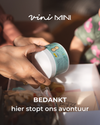Vini Mini stopt
Vini Mini stopt. Het is niet makkelijk, want bijna vijf jaar lang hebben we met veel passie gewerkt aan onze missie: zoveel mogelijk kinderen zonder allergieën. Tegelijkertijd dankjewel aan iedereen die dit avontuur mogelijk heeft gemaakt. Ouders, zorgverleners, partners, investeerders en ons geweldige team. Dankzij jullie hebben we elke dag geprobeerd een verschil te maken en de wereld voor kinderen een stukje mooier te maken. 💛
ENTER USING PASSWORDStore owner? LOGIN
